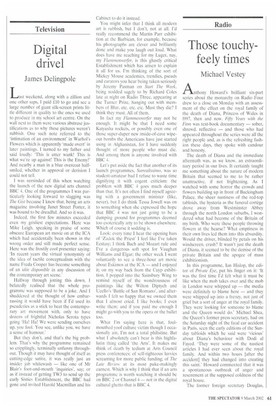Digital drivel
James Delingpole
Last weekend, along with a zillion and one other saps, I paid £10 to go and see a large number of giant silk-screen prints little different in quality to the ones we used to produce in my school art centre. On the wall next to them were various abstruse justifications as to why these pictures weren't rubbish. One such note referred to the 'intimation of an environment' in Warhol's Flowers which is apparently 'made overt' in later paintings. I turned to my father and said loudly: This is utter wank! This is what we're up against! This is the Enemy!' And nearby a man in a blue overcoat halfsmiled, whether in approval or derision I could not tell.
I was reminded of this when watching the launch of the new digital arts channel BBC 4. One of the programmes I was particularly looking forward to slagging was The Gist because I knew that, being an arts magazine involving Janet Street Porter, it was bound to be dreadful. And so it was Indeed, the first few minutes exceeded even my grisliest expectations. Here was Mike Leigh, speaking in praise of some obscure European art movie on at the ICA which had accidentally been shown in the wrong order and still made perfect sense. Here was the frostily cool presenter saying: 'In recent years the virtual synonymity of the idea of tactile conceptualism with the name Freda Cooper has become something of an idee disponible in any discussion of the contemporary art scene.'
Halfway through jotting this down, I belatedly realised that the whole programme was supposed to be a joke. And I shuddered at the thought of how embarrassing it would have been if I'd used its pseuderies as a stick to beat the contemporary art movement with, only to have dozens of frightful Nicholas Scrota types going 'Ha! Ha! We were sending ourselves up, you fool. You see, unlike you, we have a sense of humour.'
But they don't, and that's the big problem. That's why the programme remained so cripplingly, terminally unfunny throughout. Though it may have thought of itself as cutting-edge satire, it was really just an insider job whitewash — like one of Mr Blair's foot-and-mouth 'inquiries', say; or as if instead of getting TW3 to send up the early Sixties Establishment, the BBC had gone and invited Harold Macmillan and his Cabinet to do it instead.
You might infer that I think all modern art is rubbish, but I don't, not at all. I'd really recommend the Martin Parr exhibition at the Barbican, for example, because his photographs are clever and brilliantly done and make you laugh out loud. What does have me reaching for my Luger, nay, my Flammenwerfer; is this ghastly critical Establishment which has arisen to explain it all for us. I'm thinking of the sort of Mickey Mouse academics, trendies, pseuds and curators you hear being taken seriously by Jeremy Paxman on Start The Week, being nodded sagely to by Richard Coles late at night on Radio Three, appearing at the Turner Prize, hanging out with members of Blur, etc. etc. etc. Must they die? I think they must. All of them.
In fact my Flammenweifer may not be enough. It might be that I need some Katyusha rockets, or possibly even one of those super-duper new inside-of-cave wipeout bombs the Americans have just started using in Afghanistan, for I have suddenly thought of more people who must die. And among them is anyone involved with BBC 4.
Let's put aside the fact that another of its launch programmes. Surrealissimo, was so student-amateur had I refuse to waste time dignifying it with cogent criticism: the problem with BBC 4 goes much deeper than that. It's not often I find myself agreeing with a government minister (like, never), but I do think Tessa Jewell was on to something when she expressed the hope that BBC 4 was not just going to be a dumping ground for programmes deemed too esoterically arty to be shown elsewhere. Which of course it sodding is.
Look: every time I hear the opening bars of qadok the Priest' I feel like I've taken Ecstasy; I think Bach and Mozart rule and I've a dangerous soft spot for Vaughan Williams and Elgar; the other week I went voluntarily to see a three-hour art movie about Eskimos at the ICA — and I enjoyed it; on my way back from the Cuyp exhibition, I popped into the Sainsbury Wing to remind myself of the wondrousness of paintings like the Wilton Diptych and Ucello's 'Battle of San Romano', and afterwards I felt so happy that we owned them that I almost cried. I like books; I even write them; and if you paid me enough I might go with you to the opera or the ballet too.
What I'm saying here is that, foulmouthed yoof culture victim though I occasionally am, I'm not a total philistine. But what I absolutely can't bear is this highfalutin thing called 'the Arts'. It makes me think of death by tedium at Arts Council press conferences; of self-righteous luvvies screaming for more public funding; of The Late Review at its most puke-makingly earnest. Which is why I think that if an arts programme is worth watching it should be on BBC 2 or Channel 4 — not in the digital cultural ghetto that is BBC 4.














































































 Previous page
Previous page